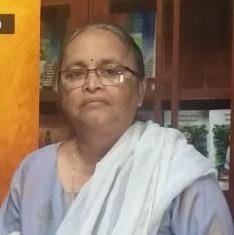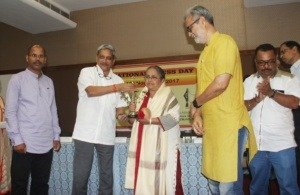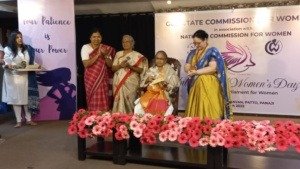
A profile of a lifelong journey through language, journalism, and women’s issues in Goa
From the vibrant bylanes of Panaji to the heart of Goa’s official language movement, Suhasini Prabhugaonkar’s voice has long echoed with purpose, resilience, and empathy. A pioneer in Konkani journalism and a torchbearer for women’s narratives, Suhasini has spent over three decades shaping public discourse with her pen, her presence, and her quiet power.
“I was born at a time when Goa’s liberation was near. Growing up in a middle-class joint family in Panaji, my father was an assistant electric engineer, my mother a homemaker,” she shares. “They were strict, but they gave me values that have lasted a lifetime.”
Her early schooling in a Marathi government school and later at People’s High School laid the foundation of a journey steeped in learning and curiosity. After graduating from Dempo College of Commerce and Economics, Suhasini pursued law at Salgaonkar Law College. “Writing, however, was always my first love,” she says. “Whether it was essays, stories, or skits in Hindi and Marathi − I found joy in expression.”
The seeds of journalism were sown not by design, but by chance and inspiration. “It was Vrinda Shrinivas Gaonkar who introduced me to All India Radio Akashwani’s Konkani and Marathi programming,” she recalls. “Later, during the official language agitation, civil engineer and writer Datta Shripad Nayak encouraged me to write for a monthly called Soungadi. That world of writers, books, and activism moved me deeply.”
With the birth of Sunaparant in 1987, Goa’s first Konkani daily in the Devanagari script, Suhasini’s professional journey took flight. Encouraged by Nayak, she applied for the post of sub-editor. She was selected, and what began as an editorial role soon turned into a lifelong calling.
Suhasini went on to work at Rashtramat, freelanced for Navprabha, and eventually dedicated 25 years to Gomantak as a field reporter becoming a respected figure in Goa’s media landscape. “Column writing started early, but I focused more on it after retirement in 2018. I still write regularly for Bhangarbhuin, a Konkani daily by Prudent Media,” she says.
Her mentors most notably Chandrakant Keni instilled in her a sense of fearless honesty. “He always said, ‘A journalist is the mirror of society. Write the truth, don’t distort it. And remember, a journalist never retires.’”
Throughout her career, Suhasini chased stories with depth and dignity. “I was the first woman reporter at Sunaparant, and the first female journalist elected to the Goa Union of Journalists four times,” she says proudly. “I also represented Goa at the Indian Federation of Working Journalists as secretary for women and as vice president.”

Issues of women’s empowerment remained central to her work. “I covered stories on female foeticide, the Goa State Commission for Women, the 33% reservation bill, and policies like the Ladli Laxmi scheme,” she says. Influenced by feminists like Sabina Martins and Albertina Almeida, Suhasini’s writing was firm but compassionate. “Even when I raised difficult questions, I did it without hurting people. That’s something I learnt from Keni-bab.”
She also covered major political movements, communal flare-ups like the Curchorem and Panaji riot, and was often the lone woman reporter on the field. Her ability to report with a human touch, while holding power to account, earned her both respect and readership.
Suhasini draws inspiration from a long list of mentors and public figures: her mother Shashikala, who believed in self-reliance; freedom fighter Gopal V. Prabhugaonkar; and senior journalists like Ravindra Kelekar, Uday Bhembre, Damodar Mauzo, and Rajdeep Sardesai. “Even politicians like Manohar Parrikar and Shashikala Kakodkar shaped my understanding of governance and leadership,” she notes.
As a journalist, Suhasini is anchored by values: “Hard work, dedication, simplicity, and truth.” Her influences include Lokmanya Tilak’s principle that “truth is the essence of journalism.” In an era before mobile phones and laptops, she travelled by bus with fellow journalists, wrote stories late into the night, and did radio and television commentary during Goa Assembly sessions.
But it wasn’t without struggle. “It was a male-dominated world. Early mornings and late nights were tough. I had accidents, commuted long distances to Margao, and faced pressures that many women would have bowed down to,” she says. “But I never gave up. My family supported me. My children taught me how to use smartphones and laptops.”
Her approach to balancing family and work is candid and empowering: “A woman, if determined, can do both. I stayed away from vices, stuck to a direct approach, and spoke up to my editors when needed. It worked.”
One of Suhasini’s most memorable contributions was her role in the Konkani official language agitation. “I remember the last protest at Azad Maidan turned violent. Mathany Saldanha gave a stirring speech and was injured in the chaos. I ensured he was rushed to the hospital immediately,” she recalls. “Language connects people. In a globalised world, it becomes even more important to preserve our roots.”
Among her proud milestones, Suhasini also considers it significant that her consistent and committed focus on women-related issues eventually led many of her male colleagues to follow suit. That shift – when others in the profession began covering stories previously dismissed as ‘soft’ or ‘niche’ – was proof that her efforts were not only impactful, but influential.

In 2025, Suhasini took another major step she published her first Konkani book Vyaktitva – Shime Paltadi, a compilation of her columns. “It was Adv. Uday Bhembre who told me, ‘You’ve written so much, it’s time for a book.’ His words gave me the push I needed.”
Contributing to Konkani literature, for Suhasini, is more than personal fulfillment. “It’s my way of giving back to my mother tongue and my land. If small stories in simple Konkani inspire even a few people, I’ll consider that my reward.”
To young girls and aspiring women journalists, she offers honest advice: “Journalism isn’t glamour. It’s 48 hours of hard work in a 24-hour day. Today you have multimedia tools you can even work from home. But remember: if you’re serious, determined, and passionate, nothing can stop you.”
Suhasini Prabhugaonkar may have officially retired in 2018, but her words, wisdom, and unwavering commitment to truth continue to shape public discourse in Goa. She remains a living example of how one woman, armed with a pen and purpose, can become the voice of the people





